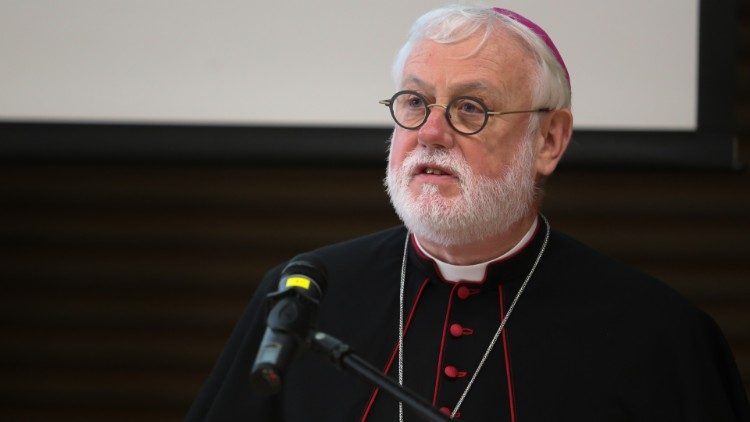The Holy See supports the United Nations’ efforts to fight corruption, according to Archbishop
His comments came before a Special Session of the General Assembly on “Challenges and Measures to Prevent and Combat Corruption and Strengthen International Cooperation” in New York, on June 3-4, 2021.
Following is the archbishop’s intervention:
Mr. President,
The Holy See welcomes this Special Session of the General Assembly focused on examining the challenges to prevent and combat corruption and the measures necessary to strengthen international cooperation against this crime. The Holy See welcomes in particular the adoption of the political declaration, “Our common commitment to effectively addressing challenges and implementing measures to prevent and combat corruption and strengthen international cooperation” at the opening of this Special Session.
The impact of corruption Corruption is limited by neither politics nor geography, and it exists in both rich and poor countries.[1] By betraying “moral principles and the norms of social justice,”[2] it hampers the attainment of integral development and the eradication of poverty. By undermining trust in public institutions and between the governing and the governed, it compromises the good functioning of a well-organized society. If we are to “provide access to justice for all and build effective, accountable and inclusive institutions at all levels,” as we pledged to do in Sustainable Development Goal 16, corruption must be confronted and eradicated.
Due to its pervasive nature and manifold consequences, the prevention of corruption requires more than legal mechanisms: we need to promote a broader “culture of integrity”. Public servants, in particular, must embrace justice, sound financial management, good governance, and social responsibility. It is also crucial to enshrine the virtue of justice in human society and to fortify the common good through the observance of the rule of law.[3] In fact, the rule of law and crime prevention must go hand in hand. The prevention of corruption is closely related to the respect for, and protection of, universal human rights, at both the national and international levels. As Pope Francis noted: “true justice is not satisfied by simply punishing criminals. It is essential to go further and do everything possible to reform, improve and educate the person.[4] As rightfully noted in the Political Declaration, it is necessary to further enhance international cooperation to combat illicit financial flows, which are both an enabler and a consequence of criminal activity, as well as to expand existing international mechanisms for asset recovery and criminal prosecution of corruption cases. Both are essential to combat impunity and to deprive “criminals and criminal organizations of any illicit gains through … identifying, tracing, seizing, confiscating, recovering and returning proceeds of crime.”[5]
The importance of the UN Convention against Corruption The Holy See acceded to the UN Convention against Corruption in 2016, intending to “contribute and to give its moral support to the global prevention, repression, and prosecution of such crime,” because “instruments of criminal and judicial cooperation constitute effective safeguards in the face of criminal activities that jeopardize human dignity and peace.”[6]
In line with the provisions of UNCAC, Pope Francis has recently enacted various legal provisions and administrative measures aimed at fostering transparency, control, and competition in the procedures for the awarding of public contracts[7] and enhancing financial disclosure of potential conflicts of interest by Holy See and Vatican City State public officials.[8]
Mr. President, This Special Session of the General Assembly offers a unique opportunity to advance the efforts of all States Parties to share best practices and lessons learned in the fight against corruption. The Holy See wishes to highlight in this regard the important contribution made by civil society organizations, corporations, faith-based organizations, and research institutions in supporting States’ efforts to contrast corruption.
Thank you.
[1] Cf. Pontifical Council for Justice and Peace, “The Fight against Corruption”, 21 September 2006.
[2] Compendium of the Social Doctrine of the Church, 411.
[3] Cf. Compendium of the Social Doctrine of the Church, 408.
[4] Pope Francis, Letter to Participants in the 19th International Congress of the International Association of Penal Law and of the 3rd Congress of the Latin-American Association of Penal Law and Criminology, 30 May 2014.
[5] Kyoto declaration on advancing crime prevention, criminal justice and the rule of law: towards the achievement of the 2030 Agenda for Sustainable Development, 24.
[6] Declaration of the Holy See upon acceding to the UNCAC.
[7] Pope Francis, Motu Proprio on transparency, control and competition in the procedures for awarding public contracts of the Holy See and Vatican City State, 19 May 2020. [8] Pope Francis, Motu Proprio on provisions on transparency in the management of public finances, 26 April 2021.
Copyright © 2021 Permanent Observer Mission of the Holy See to the United Nations, All rights reserved.










